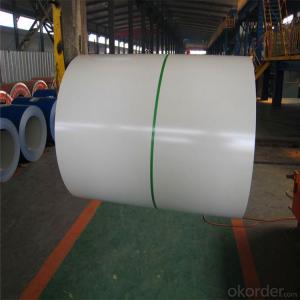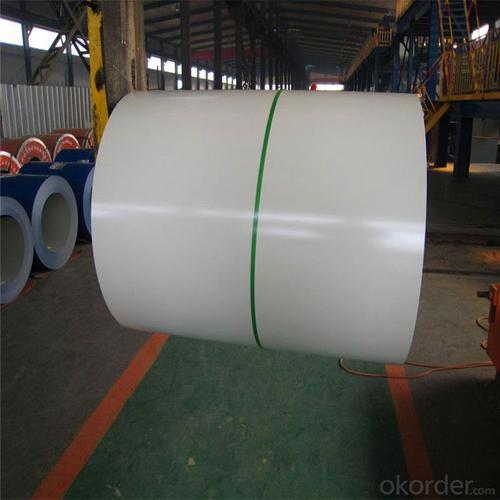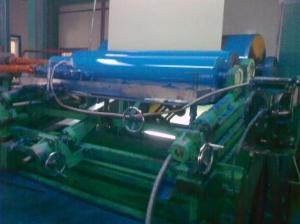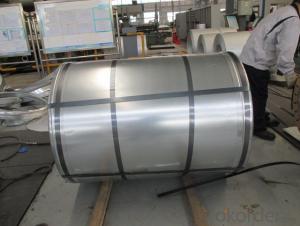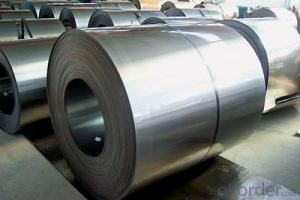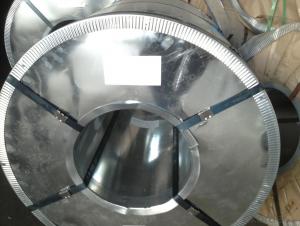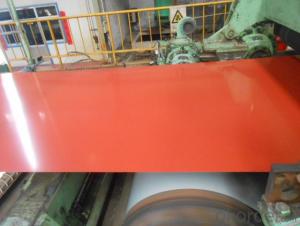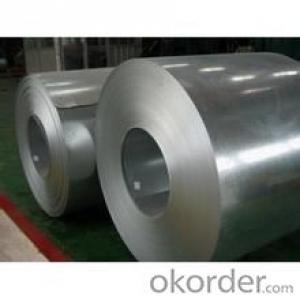Prime 700-1250mm PPGI Cold Rolled Steel Coil
- Loading Port:
- Tianjin
- Payment Terms:
- TT OR LC
- Min Order Qty:
- 100 m.t.
- Supply Capability:
- 500000 m.t./month
OKorder Service Pledge
OKorder Financial Service
You Might Also Like
Specification
Prime 700-1250mm PPGI Cold Rolled Steel Coil
Description of Prime 700-1250mm PPGI Cold Rolled Steel Coil
Product | PPGI/PPGL |
Capacity | 5,000 tons/month |
Base material | Hot dipped galvanized steel |
Thickness | 0.2-2.0mm |
Width | 600-1250mm(according to your need) |
Coil Weight | 3-6tons |
Quality | SGCC, DX51D |
Color | RAL No. or customers samples’ color |
Zinc-coating | 30g/m2-180g/m2 |
Coil ID | 508mm/610mm |
Technique | Cold rolled—hot dipped galvanized—color coated |
Painting | Top painting:15~25μm |
Back painting: 6~10μm | |
Tolerance | Thickness: +/-0.02mm |
Width:+/-2mm | |
Shipment time | within 15-45 workdays |
Payment | T/T, L/C at sight |
Packing | Standard export packing |
The special order can be negotiated. | |
Application of Prime 700-1250mm PPGI Cold Rolled Steel Coil
APPLICATION OF OUR PREPAINTED STEEL | ||||||||||
Construction | Outside | Workshop,agricultural warehouse,residential precast unit | ||||||||
corrugated roof,roller shutter door,rainwater drainage pipe,retailer booth | ||||||||||
Inside | Door,doorcase,light steel roof stucture,folding screen,elevator,stairway,ven gutter,Construction Wall | |||||||||
Electrical applicance | Refrigerator,washer,switch cabnet,instrument cabinet,air conditioning,micro-wave owen,bread maker | |||||||||
Fuiniture | Central heating slice,lampshade,chifforobe,desk,bed,locker,bookself | |||||||||
Carrying trade | Exterior decoration of auto and train,clapboard,container,isolation lairage,isolation board | |||||||||
Qthers | Writing panel,garbagecan,billboard,timekeeper,typewriter,instrument panel,weight sensor,photographic equipment | |||||||||
Products Show of Prime 700-1250mm PPGI Cold Rolled Steel Coil

Product Advantages
1.With nearly 20 years experience in prepainted steel, accommodate different marketdemands. | ||||||||||||||
2.'Quality first, service first' is our business aim; 'The good faith get respect,cast quality market' is our Business philosophy . | ||||||||||||||
3.Having two series producttion line,with the abbual production capacity of 240000 tons. | ||||||||||||||
4.Exceed International ISO9001:2008&ISO14001:2004 quality and environmental standards | ||||||||||||||
5.Meet with ROHS standard |
Company Information
CNBM International Corporation is the most important trading platform of CNBM group.
Whith its advantages, CNBM International are mainly concentrate on Cement, Glass, Iron and Steel, Ceramics industries and devotes herself for supplying high qulity series of refractories as well as technical consultancies and logistics solutions.


F A Q
1, Your advantages?
professional products inquiry, products knowledge train (for agents), smooth goods delivery, excellent customer solution proposale
2, Test & Certificate?
SGS test is available, customer inspection before shipping is welcome, third party inspection is no problem
3, Factory or Trading Company?
CNBM is a trading company but we have so many protocol factories and CNBM works as a trading department of these factories. Also CNBM is the holding company of many factories.
4, Payment Terms?
30% TT as deposit and 70% before delivery.
Irrevocable L/C at sight.
5, Trading Terms?
EXW, FOB, CIF, FFR, CNF
6, After-sale Service?
CNBM provides the services and support you need for every step of our cooperation. We're the business partner you can trust.
For any problem, please kindly contact us at any your convenient time.
We'll reply you in our first priority within 24 hours.
- Q: How is special steel different from regular steel?
- Special steel is different from regular steel due to its unique composition and properties. Unlike regular steel, special steel is specifically designed to possess enhanced characteristics such as increased strength, durability, corrosion resistance, and heat resistance. Special steel is often alloyed with various elements like chromium, nickel, molybdenum, or vanadium to achieve these improved qualities, making it suitable for specific applications that require superior performance under challenging conditions.
- Q: How does special steel contribute to the impact resistance of products?
- Special steel, also known as high-strength or high-performance steel, plays a crucial role in enhancing the impact resistance of various products. This type of steel is specifically designed to possess exceptional strength, toughness, and durability, making it highly resistant to deformation and fracture under high-stress conditions. One of the key factors that contribute to the impact resistance of special steel is its composition. Special steel often contains alloying elements such as manganese, chromium, nickel, molybdenum, and vanadium, which are incorporated to enhance its mechanical properties. These alloying elements provide the steel with increased hardness, tensile strength, and resistance to wear, corrosion, and fatigue. As a result, products made from special steel are capable of withstanding heavy impact loads without deforming or breaking. Furthermore, the microstructure of special steel plays a vital role in its impact resistance. Through advanced manufacturing techniques, the steel's microstructure can be fine-tuned to achieve a desirable combination of strength and toughness. Special heat treatment processes, such as quenching and tempering, can further refine the microstructure, resulting in a material that can absorb and dissipate energy more effectively. This makes special steel highly resistant to cracks and fractures, even when subjected to sudden and severe impacts. In addition to its intrinsic properties, special steel is often used in the form of engineered components or structures that are specifically designed for impact resistance. For example, in the automotive industry, special steel is utilized for manufacturing components like crash beams, bumpers, and roll cages. These components are designed to absorb and distribute impact energy, protecting the vehicle and its occupants during accidents. Overall, special steel significantly contributes to the impact resistance of products by providing superior strength, toughness, and durability. Its unique composition, microstructure, and design enable it to withstand high-stress conditions and absorb impact energy effectively. As a result, products made from special steel offer enhanced safety and reliability, making them suitable for a wide range of applications in industries such as automotive, aerospace, construction, and defense.
- Q: Can special steel be used in high-speed applications?
- Indeed, special steel can be utilized in high-speed applications without a doubt. Special steel encompasses a variety of steel alloys that have been intentionally developed and engineered to possess enhanced properties like exceptional strength, durability, and resistance to wear and corrosion. These properties render special steel appropriate for a wide range of demanding applications, including those involving high speeds. In high-speed applications, such as aerospace, automotive, machining, and power generation, the material must endure extreme conditions, including elevated temperatures, vibrations, and mechanical stress. Special steel is purposefully designed to meet these requirements and deliver outstanding performance even in the face of such challenging circumstances. For instance, high-speed steel (HSS) is a specific type of special steel formulated to retain its hardness and strength at high temperatures, which makes it ideal for cutting tools like drills, end mills, and saw blades. Similarly, stainless steel variants like martensitic and precipitation-hardening stainless steels are frequently employed in high-speed applications due to their exceptional strength, toughness, and resistance to corrosion. Furthermore, the advancement of cutting-edge manufacturing techniques, such as powder metallurgy, has facilitated the production of special steel with even superior properties, including higher hardness, improved wear resistance, and enhanced dimensional stability. These advancements have further expanded the range of applications for special steel in high-speed industries. To summarize, special steel is a versatile and dependable material that can be effectively utilized in high-speed applications. Its unique properties make it suitable for withstanding demanding conditions and delivering excellent performance, which is why it is the preferred choice for industries that require materials capable of enduring high speeds, temperatures, and mechanical stress.
- Q: How does special steel perform in low-temperature environments?
- Special steel, also known as low-temperature steel, is specifically designed to perform exceptionally well in low-temperature environments. One of the key features of special steel is its ability to maintain its strength and toughness even at extremely low temperatures. This is crucial in industries such as oil and gas, where equipment and structures are exposed to extreme cold conditions. When exposed to low temperatures, regular steel tends to become brittle and lose its mechanical properties, making it prone to cracking and failure. However, special steel is formulated with specific alloying elements, such as nickel, chromium, and molybdenum, which enhance its low-temperature performance. These alloying elements help to prevent the formation of brittle phases, which allows the steel to retain its toughness and ductility even at sub-zero temperatures. Special steel is extensively used in cryogenic applications, where temperatures can reach as low as -196 degrees Celsius (-320 degrees Fahrenheit). It is commonly employed in the construction of cryogenic storage tanks, liquefied natural gas (LNG) carriers, and other components that come into contact with extremely cold fluids or gases. In low-temperature environments, special steel not only maintains its mechanical properties but also exhibits excellent resistance to corrosion. This is vital, as low temperatures can exacerbate corrosion issues in many materials. The corrosion resistance of special steel is attributed to its high nickel content, which forms a protective oxide layer that prevents the steel from corroding, even in harsh conditions. Overall, special steel is specifically engineered to withstand the challenges posed by low-temperature environments. Its ability to retain strength, toughness, and corrosion resistance makes it an ideal choice for various industries operating in extreme cold conditions.
- Q: How does special steel contribute to the automotive material recycling?
- Special steel plays a significant role in automotive material recycling by providing high-strength and durable components that can be easily disassembled and reused. Its properties allow for effective recycling processes, enabling the extraction of valuable materials from end-of-life vehicles. This contributes to the sustainability of the automotive industry by reducing waste and conserving resources.
- Q: How does special steel perform in corrosive environments?
- Special steel is specifically designed to perform exceptionally well in corrosive environments. It is resistant to corrosion caused by various factors such as moisture, chemicals, and high temperatures. This type of steel typically contains higher levels of alloying elements such as chromium, nickel, and molybdenum, which enhance its corrosion resistance properties. Additionally, special steel undergoes specific heat treatments and surface finishes to further improve its resistance to corrosion. Overall, special steel exhibits excellent performance and longevity in corrosive environments, making it a preferred choice in industries such as oil and gas, chemical processing, marine, and construction.
- Q: How does special steel contribute to the manufacturing of cutting blades?
- Special steel plays a crucial role in the manufacturing of cutting blades. Cutting blades are required to have exceptional strength, durability, and sharpness to efficiently perform their function. Special steel, also known as tool steel, possesses unique properties that make it an ideal material for manufacturing cutting blades. Firstly, special steel has excellent hardness, which enables cutting blades to maintain their sharpness for an extended period. Cutting blades made from special steel can withstand the wear and tear that occurs during cutting operations. This hardness allows the blades to retain their cutting edge, resulting in a longer lifespan and improved cutting performance. Moreover, special steel offers exceptional toughness, which is crucial for cutting blades. During cutting operations, blades are subjected to high impact and stress. Special steel's toughness helps absorb these forces and prevents the blades from breaking or chipping. This ensures that the cutting blades can withstand demanding cutting tasks without compromising their performance. Additionally, special steel provides excellent corrosion resistance. Cutting blades often come into contact with various materials, including moisture and chemicals. The corrosion resistance of special steel prevents the blades from rusting or corroding, ensuring their longevity and reducing the need for frequent replacements. Furthermore, special steel offers good machinability, making it easier to shape and form into the desired blade design. This enhances the manufacturing process by enabling the production of cutting blades with complex shapes and intricate features. The machinability of special steel allows manufacturers to create blades with precise cutting edges and optimal geometries, resulting in superior cutting performance. In conclusion, special steel contributes significantly to the manufacturing of cutting blades by providing hardness, toughness, corrosion resistance, and good machinability. These properties ensure that cutting blades made from special steel are long-lasting, durable, and capable of delivering exceptional cutting performance in various applications.
- Q: What are the properties of ultra-high-strength steel?
- Ultra-high-strength steel possesses exceptional mechanical properties, including high tensile strength, excellent toughness, and superior fatigue resistance. It exhibits high stiffness, enabling it to withstand heavy loads and maintain its shape even under extreme conditions. With its low weight and high strength-to-weight ratio, this steel offers enhanced fuel efficiency and increased payload capacity. Additionally, it exhibits good weldability, corrosion resistance, and is often used in applications where both strength and durability are paramount, such as in automotive, aerospace, and construction industries.
- Q: How is HSLA steel used in the construction industry?
- HSLA (High-Strength Low-Alloy) steel is commonly used in the construction industry for various applications. It offers increased strength, durability, and better resistance to corrosion compared to conventional carbon steel. HSLA steel is used in the construction of bridges, buildings, pipelines, and other structures where high strength and reliability are required. Additionally, it can be found in structural components like beams, columns, and trusses, as well as in reinforcement bars and plates. Overall, HSLA steel plays a crucial role in enhancing the safety, longevity, and overall performance of construction projects.
- Q: How do alloying elements affect the properties of special steel?
- Alloying elements have a significant impact on the properties of special steel. These elements are added in varying amounts to enhance specific characteristics such as strength, hardness, corrosion resistance, and wear resistance. For example, the addition of chromium increases the steel's resistance to corrosion, while molybdenum improves its strength at high temperatures. Alloying elements play a crucial role in tailoring the properties of special steel to meet specific application requirements.
Send your message to us
Prime 700-1250mm PPGI Cold Rolled Steel Coil
- Loading Port:
- Tianjin
- Payment Terms:
- TT OR LC
- Min Order Qty:
- 100 m.t.
- Supply Capability:
- 500000 m.t./month
OKorder Service Pledge
OKorder Financial Service
Similar products
Hot products
Hot Searches
Related keywords
